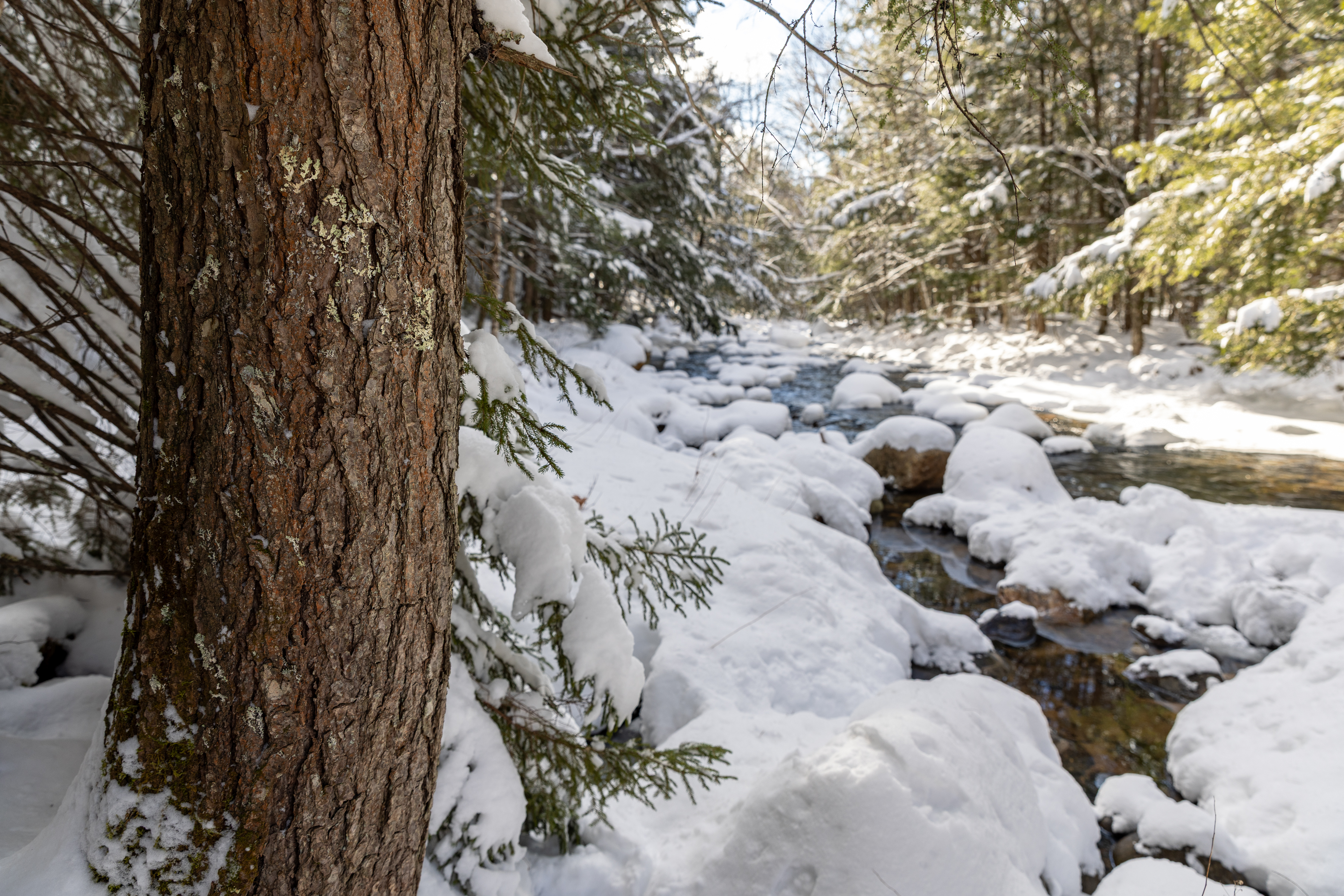- Tags:
- Climate
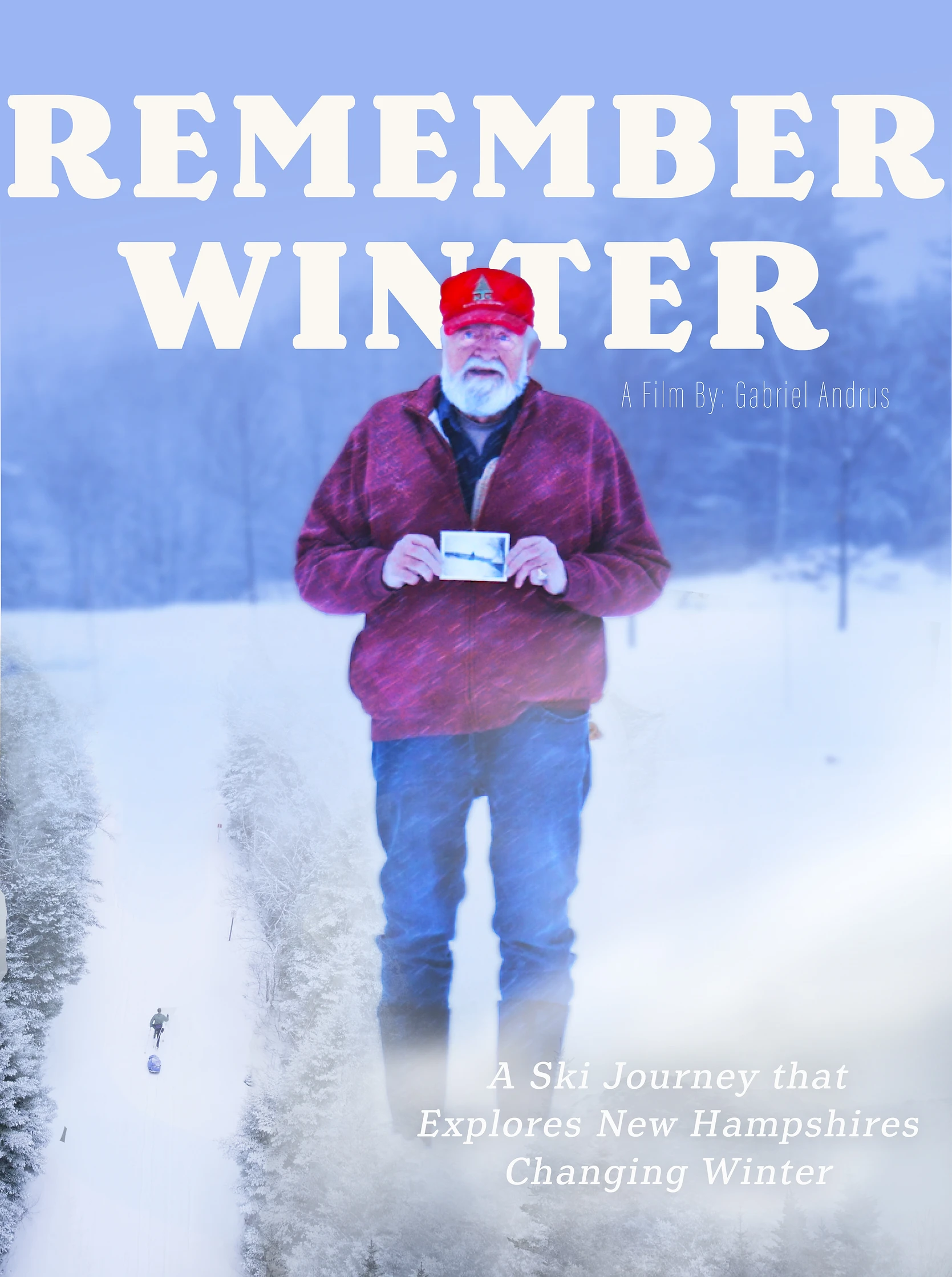
"Remember Winter" will be screened on March 26th at the Cottrell-Baldwin Educational Series.
If you ever have the privilege of meeting Gabriel Andrus, you will probably walk away from the interaction with the word “inspiration” seared on the interior of your mind like a sunrise on an icy morning.
He lives on a sailboat in New Bedford, Massachusetts. He works at a non-profit out of Marlow, NH that connects teens with the outdoors. He left college after two years because, as he says, “I didn’t want to talk about videography and photography anymore, I wanted to go out and do it.” And then, he made a documentary.
“Remember Winter” is Andrus’ gift to his beloved home state of New Hampshire, and the glittering, snow covered winters that once solidified the state’s identity as a winter outdoorsman’s paradise. The film premiered in Marlow on February 9 and will be screened as part of the Cottrell-Baldwin Environmental Lecture Series on March 26 in Hillsborough, followed by a discussion with Andrus.
“I wanted to showcase winter in NH in a deep, intimate way,” he says, over coffee on what feels like the first truly cold day of January. “What better way to do that than cross country skiing on a self-supported mission where I really get to appreciate its beauty and wildness.”
The film follows Andrus as he attempts to cross country ski from the New Hampshire-Canada border to his childhood home in Walpole. Along the way, he keeps weather logs, reflects on the beauty of the landscape around him, and exclaims at first sightings of the White Mountains.
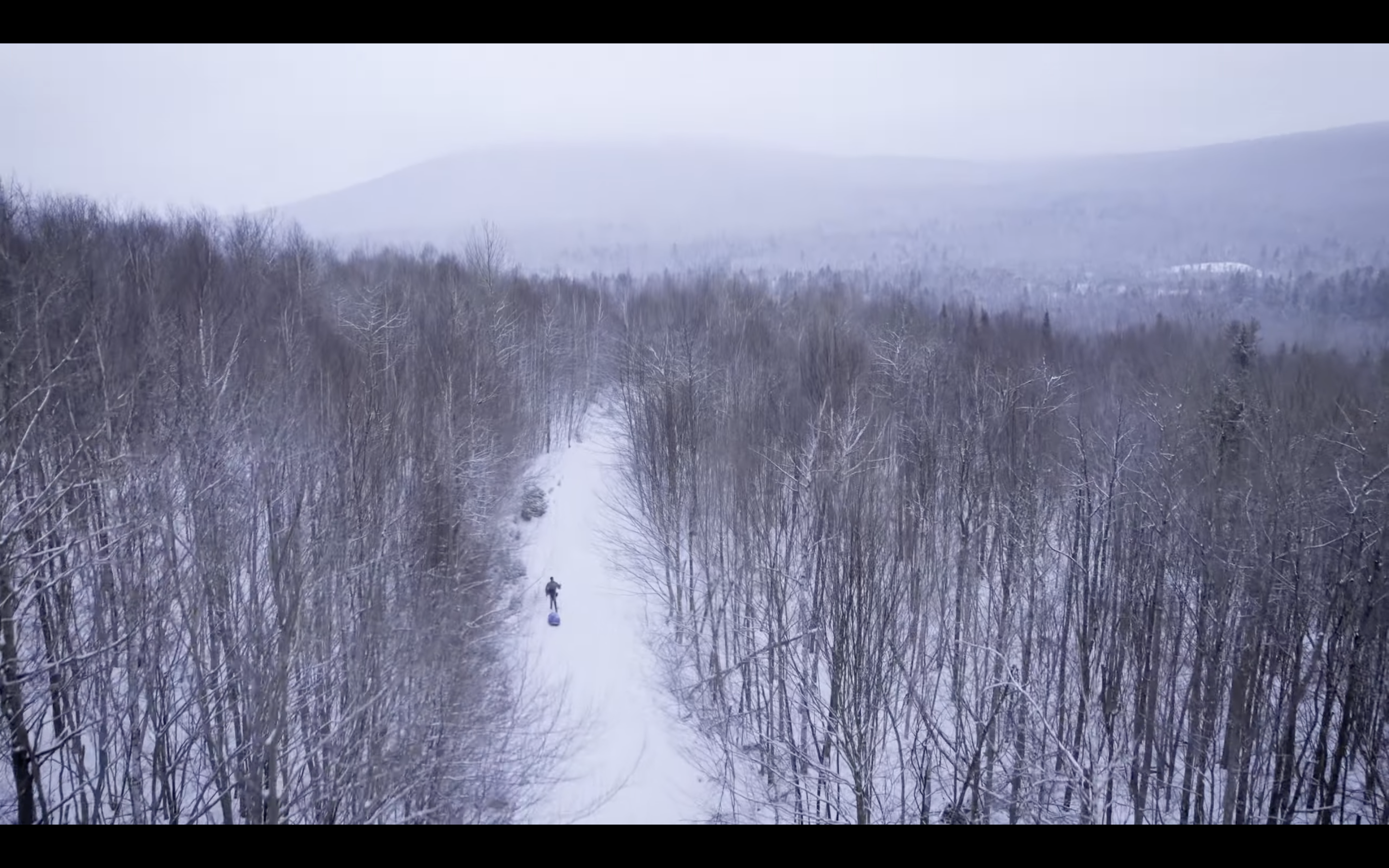
“It almost felt like a rite of passage for me,” he says of the journey.
But New Hampshire’s winter did not live up to its usual snowy splendor and Gabriel’s trek was cut short just south of the White Mountains. The snowmobile trails he had mapped to speed him home went from snow-covered passages to muddy bogs and slushy slopes. His luck, and the snow, had run out.
Enter the meaning behind Gabriel’s chosen title for his feature, and the real inspiration behind his desire to journey into New Hampshire’s winter woods: while going through old photographs with his grandfather, Andrus stumbled across a shot of his grandpa as a young boy, standing in front of a towering snowbank almost twice his height. A lifelong NH resident, Grandpa Andrus had many photos just like it, the background a white out, heaps of snow piling up around the edges.
These photos sent Gabriel on a different journey, one that led him into conversations with scientists, naturalists, farmers, outdoor recreationists, and generations of New Hampshire-ites to ask the questions: does anyone remember winter? And is this what it’s supposed to be like?
Since 1917, New England’s winter season has shortened by over three weeks, according to data gathered by the Appalachian Mountain Club. Additionally, in the same time span, the region has lost 19 days of snow accumulation, and 20 days of frost — or any day with temperatures below 32°F. In fact, parts of Massachusetts and Southern coastal New Hampshire account for 10 percent of our global snow cover decline, according to a 2023 study by Salem State University.
By my own observations alone, New England winters just don’t seem to be quite what they should be. In the days leading up to my meeting with Gabriel in mid- January, temperatures fluctuated between 26°F and 52°F, and in the time since that meeting, I watched the thermometer outside my window in Central MA climb to as high as 62°F. So, for young people like Gabriel (21) and me (23), it is hard to imagine snowfall like that of Grandpa Andrus’ childhood, something that Gabriel mentions to his grandfather in the film. His grandfather’s response:
“I’d be surprised if you ever see it like that.”
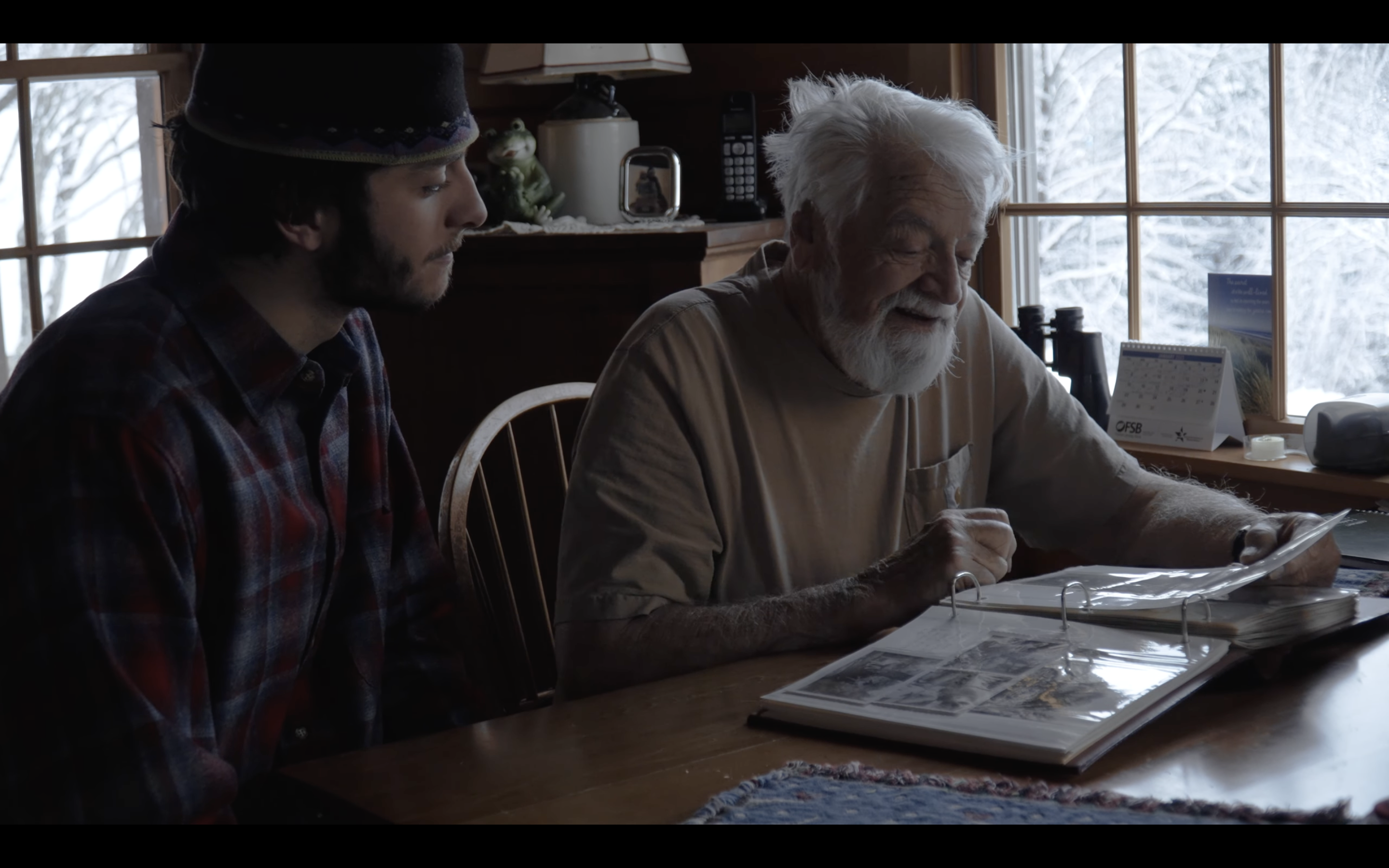
For a young person with so many winters left to experience, I wondered if that made Gabriel want to curl up in a ball and cry, like it sort of did for me. But, of course, he had a different perspective.
“It is sad to know that’s the direction we’re heading,” he said, “But at the same time, it made me just want to appreciate winter when we have it. Every time we get snow, we should go out and enjoy it. Flip the script a little bit.”
It’s this attitude that makes Andrus, in my opinion, a rousingly unique voice in climate activism and education. The tendency when approaching the topic of climate change seems to be to focus on the losses that will be suffered as a result of its persistence. It’s an easy approach to take, since the discussion itself could outlast the remainder of humanity. As a result, people are avoiding the topic more and more as further debate leads into a new phenomenon: climate anxiety.
Climate anxiety goes by many names: climate grief, climate depression, eco-anxiety, or solastalgia — the grief that follows drastic change of one’s home environment.
It is a fairly new trend in mental health studies, first emerging into interest in the early 2020s. Since then, as climate change effects grow more apparent and more reported upon, the usage of the term has skyrocketed — Google searches for “climate anxiety” soared by 565% in 2021, according to an article by the Yale Sustainability Institute.
Experts define climate anxiety as “fundamental distress about climate change, and its impacts on the landscape and human existence.” That distress can manifest in the form of intrusive thoughts about the long-term future of humanity, or the globe, or nightmares about climate change related events, among other things. It is contributing to what experts are describing as “small but notable changes” in citizen morale.
According to a 2022 study by the Yale Program and George Mason University Center on Climate Change Communication, one in 10 Americans report that they experienced some sort of anxiety symptoms in relation to thoughts about climate change (i.e. feeling unable to stop thinking about climate change or feeling on edge due to thoughts about climate change). Consequentially, to cope with these feelings, about one in four Americans report that they try not to think about or avoid information pertaining to climate change, according to the same 2022 study.
It’s a logical response: if a thought causes distress, why waste time thinking it? However, in the context of our warming planet, it is an unproductive way to think about something that demands productivity. Quickly.
Which is why Andrus says “Remember Winter” is trying to take a different approach.
“Hope and optimism invite more people to the conversation by making it more approachable,” says Andrus. “They get motivated, they’re ready to reach out and connect with people, to think of the next thing. When you have a sense of negativity or hopelessness, they think ‘Oh well, what can I do?’ It doesn’t make any progress.”
Progress, according to Andrus, is what is going to ignite the fire that will fuel our actions in the fight against not only a warming climate, but the psychological distress that comes with it.
“There’s going to be so much change that is going to happen in this century,” he says, smiling. “Knowing that gets me fired up, makes me want to do something about it.”
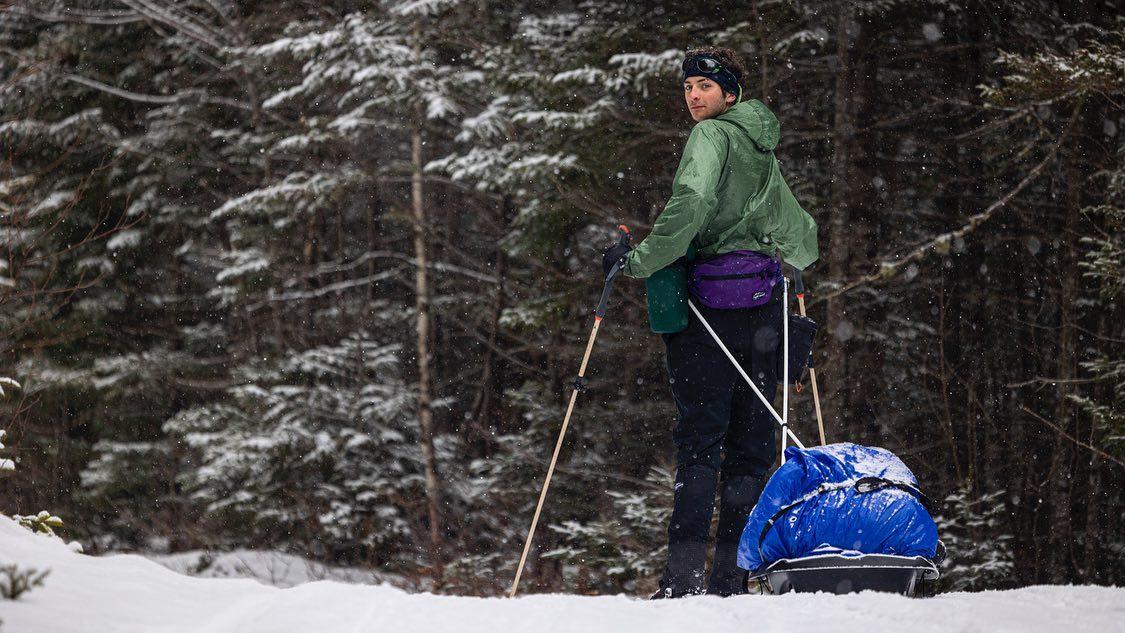
At first glance, "Remember Winter” may seem like another film about another thing climate change has stolen from us. But it is so much more than that. “Remember Winter” is as much a journey into nature, as it is a young person’s odyssey into an unknown future. It reckons with information that should be enough to make anyone with the rest of their life ahead of them throw in the towel, and instead turns it on its head, asking “Well, what am I going to do with this then?” It stands apart from other films of its genre, because it is made by someone with the most to lose, and yet refuses to accept that losing is even a possibility.
I have never had a conversation about climate change that has left me feeling hopeful for the future. I have also never been able to get behind the sentiment that my generation, the next generation, could or even should save the world. And then I met Gabe Andrus.
Young people are going to change not just the future of the world, but the way we think about it.
We who have been handed our ending and told we will be the ones to craft a different one; we who have grown up listening to the sentencing of our societies; we who have spent our entire lives in a cloud of information that only seems to grow thicker; we are the ones who have found hope in the bleakest of hours because what else is there to do.
It’s easy to peer into the murkiness of the future and feel like the quagmire of unknowns is too much to navigate. It’s easy to look at the destruction and chaos happening around us and copy and paste it into the next hundred years. But, in the words of Virginia Woolf, “The future is dark, which is on the whole, the best thing a future can be.”
We don’t know for certain what is coming. And isn’t that a blessing?
Young people may be the future. But so is hope. Find it. Have it. Don’t just cling to it, carry it with you and let it guide the stories you tell and the words you use to tell them. Make a living out of hope.
And if you ever find yourself slipping from hope, think about Gabriel. Think about all of the others like him. You owe him better. You owe the future better. The world does not end with a prediction.
Sophie Oehler is the communications coordinator at the Forest Society.
Gabriel Andrus will present his film, "Remember Winter" at the Cottrell-Baldwin Educational Series in Hillsboro on March 26th. For more information on how to attend, visit the Cottrell-Baldwin Educational Series landing page.
